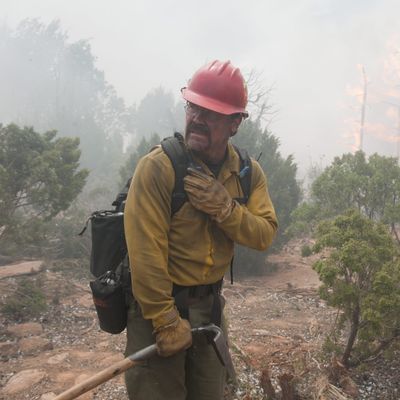
Are firefighter movies secretly the most potent antiwar movies? I’ll admit, I haven’t seen any firefighter films since Backdraft, which was about a crew on the trail of a serial arsonist. Still, fire is a faceless and merciless cinematic foe, and watching people fight it, whether in film and TV or on the news, looks the most like fighting God than any other human activity. Only the Brave is at its core much more of a man-versus-nature story, less about getting bad guys and more about dealing with the horror that ensues when nature occasionally sets itself ablaze. There’s less of a moral question about trying to stop a fire from destroying people’s homes than, say, fighting in any war since WWII, and no anxiety-inducing hails of gunfire. But you still get the band-of-brothers mechanics of war narratives, and the smoke and struggle and life-or-death situations. It feels like a win-win to me.
Only the Brave is based on the true story of Prescott, Arizona’s Granite Mountain Hotshots, the first ever municipal fire crew to be certified as Hotshots (that is, the class of firefighter that deals on the ground with wildfires). Led by their supervisor Eric Marsh (Josh Brolin), they became local heroes, but if you don’t know their story I’d advise against Googling it, or the GQ article the film is based on. The film opens with them still uncertified and frustrated at their inability to stave off yet another fire. Meanwhile, young addict Brendan McDonough (Miles Teller) stumbles his way into fathering a child, and suddenly feeling the urge to step up and be responsible for her, arrives at the department looking for work. Cue a predictable yet comforting redemption arc, from McDonough’s fast friendship with hazer turned roommate Chris (Taylor Kitsch) to the surrogate father he finds in Marsh, who we come to learn may not be that different from him.
Only the Brave is meandering and picaresque, sometimes to its own detriment. Oftentimes it plays out like a condensed season of television, a format for which it might actually have been better suited, with its long, subtly rendered character arcs and ensemble cast. The cast, by the way, is incredibly stacked — Jeff Bridges, Jennifer Connelly, and Andie MacDowell all acquit themselves agreeably in roles that feel like they could have used a lot more screen time. Connelly in particular, as Marsh’s loving but long-suffering wife, feels well-positioned to subvert many of the expectations around that kind of character … until she doesn’t. But Teller and Brolin lead the film with incredibly watchable naturalism that never descends into sentimentality.
The film is improbably directed by Joseph Kosinski, apparently putting his sci-fi auteur dreams on hold after the gorgeous but hollow Tron: Legacy and Oblivion. There’s little in the way of minimalist architecture or light-up catsuits to be found among this grubby crew, but there’s a sense of quiet shared by all the films, a resistance to all-out bombast. Most of Marsh’s job involves watching the blaze from a distance, taking temperature and humidity readings, and checking the wind direction. Despite their title, these hotshots are anything but. Only the Brave feels like a film that would have made sense coming from Peter Berg or Michael Bay, but Kosinski mostly pulls back on the macho cheerleading to find something more objective, and ultimately, deeply emotional. Still, even he can’t keep himself from the occasional aerial glamour shot of the team, posing in formation on top of a mountain while guitars blare. It might just be a firefighter movie thing.

